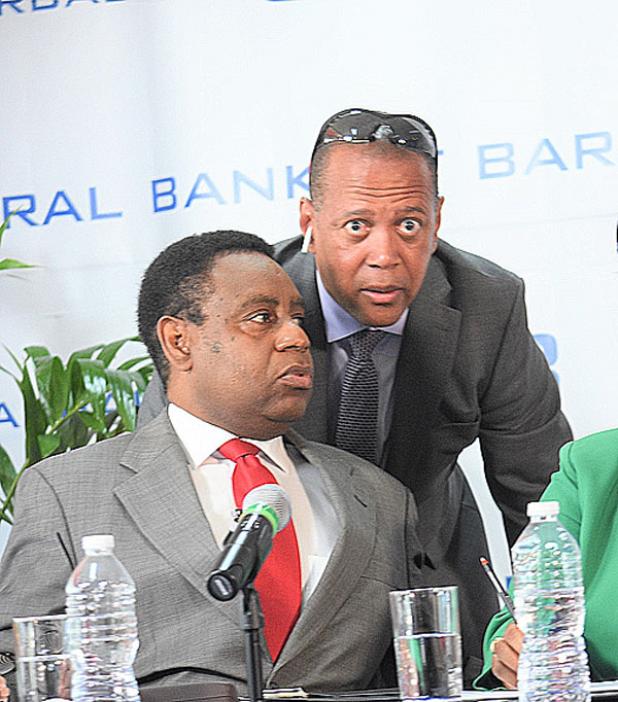
Governor of Central Bank, Cleviston Haynes (left) having a discussion with Senior Technical Adviser to Government, Dr. Kevin Greenidge during his review of Barbados’ economic performance for the first quarter of the financial year at the Central Bank yesterday.
VAT, Fuel Tax efficient sources of revenue
The Value Added Tax and the new Fuel Tax, which was recently announced, are proving to be efficient sources of revenue for the Barbados economy.
This was stated by the Governor of the Central Bank of Barbados, Cleviston Haynes, as he provided the public with an update on Barbados’ economic performance for the first quarter of 2019 during a press conference that took place yesterday.
“The Value Added Tax, which stands at $941 million, and the new fuel tax proved to be efficient sources of revenue. In addition, collections from the Garbage and Sewage Contribution and the Hotel Room Levy boosted revenue,” he said.
As a result, he reported that current revenue yielded almost $3 billion or 29.3 per cent of GDP.
He explained that the new tax measures outlined in the June 2018 budget boosted the revenue intake even though the resumption of timely payment of current year tax refunds offset some of the gains in revenue.
According to the Governor, taxes on incomes were buoyed by the improved performance of personal income taxes – $482 million, and corporate taxes – $356 million. He added that corporate income taxes benefited from the earnings of recently registered international business companies, and property tax receipts grew, due in part to tax payers taking advantage of the extension of the tax amnesty.
However, the Governor also noted that the repeal of the National Social Responsibility Levy, coupled with declines in import duties because of lower levels of import, weakened the growth in overall indirect taxes.
Additionally, the Airport Development Levy also suffered from lags in collection.
Haynes went on to note that the financial system remained stable, notwithstanding the impairment to commercial banks’ capital buffers, resulting from Government’s debt restructuring and the adoption of the IFRS 9 accounting standard in 2018.
He reported that even though the aggregate capital adequacy ration fell to 13 per cent from 17 per cent one year earlier, these levels remained above the prescribed minimum benchmark of eight per cent. (CLF)
